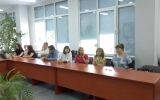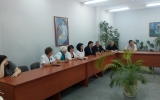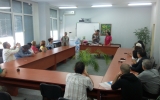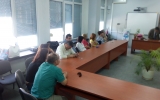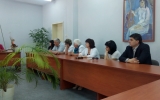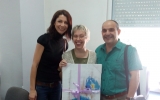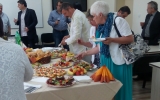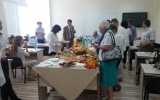Issue 11, July 2015
 Roundtable Dedicated to 10 anniversary of the department of Social workof Konstantin Preslavsky – University of Shumen, BULGARIA on topic:
Roundtable Dedicated to 10 anniversary of the department of Social workof Konstantin Preslavsky – University of Shumen, BULGARIA on topic:
Current problems of the social work in 10 years experience of the Department of Social work
 Sonya Ilieva, BULGARIA
Sonya Ilieva, BULGARIA
Professor DSc at Konstantin Preslavsky – University of Shumen, Chief Editor of online journal SocioBrains
Social consequences of Machiavellianism of contemporary Bulgarian political elite
Abstract: The Machiavellianism is understood as the use of cunning and duplicity in government or management or personal level - as hypocritical interpersonal style, cynical disregard for morals with emphasis on self-interest and personal gain. Everything mentioned here for the Machiavellianism as state policy as the norm in public life or personal characteristics can be placed for consideration in the behavior of the new Bulgarian political elite. In this context, the prevailing characteristic of the Bulgarian political elite is associated with massive abuse of power. It holds democratic changes in full eclipse procedural permeated with hypocrisy facade. The article analyzed its betrayal of democratic values, to bring in obedience of the whole Bulgarian people through various tricks.
 Anna Sender, BELARUS
Anna Sender, BELARUS
Doctor of pedagogical sciences, professor, rector of the educational establishment “Brest State University named after A.S. Pushkin”
 Tatsiana Sokolova, BELARUS
Tatsiana Sokolova, BELARUS
Master of pedagogical sciences, senior lecturer of the Department of Social Work of the educational establishment “Brest State University named after A.S. Pushkin”
Pedagogical conditions of organization of volunteer activity in the context of forming of professional orientation of future specialists of social and humanitarian profile
Abstract: On the basis of analysis of Russian and Belarusian scientists’ positions the questions of forming professional orientation as an integrative personal quality of future specialists of social and humanitarian profile by means of volunteer activity in favorable conditions and under the influence of external and internal factors are revealed in the article. The authors highlighted theoretical and methodological bases for the definition of pedagogical conditions; and grounded the pedagogical conditions oforganization of volunteer activity in the context of forming professional orientation offuture specialists of social and humanitarian profile.
 Tatiana Nichishina, BELARUS
Tatiana Nichishina, BELARUS
PhD in Pedagogic,
Docent Brest State University named after A.S. Pushkin, Belarus
Family deprivation as a precondition for deviant juvenile behaviour
Abstract: The article presents a theoretical analysis of the family deprivation issue, characteristic of problem families. Family deprivation may be caused by dysfunctional parenting, family disturbance etc. Giving weight to the central role of the family environment and, in particular, parent-child relationships, in child development and formation of their standard behaviour, the author examines the controversial issue of the determining connection between family disturbance and deviant juvenile behaviour and its nature. The article presents various approaches to the classification of typical behavioural disorders in primary school children and demonstrates the necessity of preventive measures taken in the early stages of uncontrollable juvenile behaviour.
PhD student at Volgograd State University
You swear to tell the truth or why should Lies be made criminal?
Abstract: Lie is one of the oldest сrimes known to man. Unfortunately, it exists as long as there is humanity. The Danger and irregularity of lies are fixed, perhaps, in all the scriptures of different religions — they all express prohibiting the act of lying. In addition to the prohibition of religious, moral and ethical, certain forms of falsehood are also prohibited under the threat of criminal punishment. Establishment of criminal liability for any act always requires thorough research, because the prohibition of certain acts described in the law without the need and social conditioning, will only harm the public relations, rather than protect them.
Criminal ban should be based primarily on the objective needs of society in public relations protection. Marx writes confidently: “The legislator must regard himself as a scientist. He does not make laws, he does not invent them, he only formulates them, he enunciates the inner laws of spiritual relationships”[1]. Despite the fact that this statement is debatable in relation to lies we cannot disagree with that. N.D.Sergeevsky also noted that the offender does not violate the criminal law, the perpetrator does not know all these articles - they violate known bans. The purpose of this article is to bring out reasons why certain forms of lies are punishable in Russia, the U.S.A and continental European countries.
 Zhivka Voenkinova, BULGARIA
Zhivka Voenkinova, BULGARIA
Professor, PhD, Lecturer and Head of Department Social Pedagogy at Konstantin Preslavsky – University of Shumen
Emotional intelligence - opportunities for professional development of students
Abstract: Emotional intelligence means the ability or skill to perceive, assess and manage their emotions, to distinguish the different emotions and naming and define properly and to use emotional information to be guided by this thinking and behavior. Skills that cover are: thinking; problem solving; emotions; moral behavior; social interaction; professional and academic success. University students should already have built skills and abilities important for emotional intelligence, and through them to deal with stress, stress during training. Students with higher emotional intelligence faster cope with difficulties during training, their success is higher, faster to cope with different types of workloads during the semester session. It is during training to consolidate their skills to be able to motivate their behavior, observe the emotions of others, etc.
 Zhivka Voenkinova, BULGARIA
Zhivka Voenkinova, BULGARIA
Professor, PhD, Lecturer and Head of Department Social Pedagogy at Konstantin Preslavsky – University of Shumen
Influence of the physical culture on educational activities for students
Abstract: The physical culture - this is part of the common culture of humanity, which in itself is a creative work of mastering the past and new values primarily in the area of physical development, health and education of the people. It affects the working man. that the work manages to end organized person is three times more than this, which performs diffuse. Moreover, he is always careful, reliable and activities with excellent results. The organization in the hands of such a person has great power because he successfully manages time and deeds. By means of physical culture and sport can be formed important professional standpoint mental qualities and they are: attention; operational thinking; volitional qualities; initiative; courage and determination; sustainability and more.
 Zhivka Voenkinova, BULGARIA
Zhivka Voenkinova, BULGARIA
Professor, PhD, Lecturer and Head of Department Social Pedagogy at Konstantin Preslavsky – University of Shumen
The diet - fashion or disease among the young people
Abstract: Fashion among the young people in today's world, in many cases they need to be thin, elegant and beautiful. The ultimate aim is one - could be as weaker and elegant. Whether it is healthy often remains in the background and sometimes not taken into account. Frequent cases where while experience already acquired so-called disorder feeding behavior. Imperceptibly begins to change their perception of themselves, think they are always very thick, that do not look good, that are not sufficiently beautiful and attractive. Ultimately can develop bulimia or anorexia. To successfully fight these problems, doctors use a variety of methods by which to establish above all the reasons that led the person to this condition. Undoubtedly young people from the earliest childhood should be developed desire to protect their own health. For this purpose should be formed their spiritual consciousness.
 Daniela Geleva, BULGARIA
Daniela Geleva, BULGARIA
Student - graduate specialty Social Activities, Department of Social Work at Konstantin Preslavsky, University of Shumen
Problems of social work in complex for social services for children and families - Shumen.
Abstract: Complex for social services for children and families to Shumen Municipality aims at providing every child love, care and attention given to him by his own parents, adoptive or foster family. Supports children and families at risk of building a family environment and relationships to not be abandoned children in institutions. One of the services for parents who offer the complex's Unit "Mother and Baby". It is expressed in shelter and support up to six months to mothers at risk of abandoning their children. The main objective is to prevent abandonment and placement in institutions for children from 0 to 3 years. Observations by the author of the opinion problems in the implementation of this service are: lack of literacy in the realization of everyday situations by mothers, as well as the language barrier, in terms of bilingvenost in the region. Proposed suggestions are fundamental to improving service arising from direct experience as an intern in providing this social service.
 Georgi Dubov, BULGARIA
Georgi Dubov, BULGARIA
Student in the master's program, Regulating and control in the system of social activities, Department of Social Work at Konstantin Preslavsky, University of Shumen
The child deprived of parental care - between institutions, foster families and personal desire.
Abstract: In Bulgaria accelerated process of removal of children from traditional large institutions. Still ongoing controversy "for" or "against" the process. Posts in the public space speak specialists, representatives of the public, journalists, etc. But no attempt was made to seek the views of children to be taken from the institutions. For this reason, and to develop my Master's thesis on the foster family conducted a survey among such children - children deprived of parental care. The study was realized by two focus groups. They involved a total of 61 participating children between 14 and 18. The choice of age (14-18.) Is connected with the fact that they go in a group of juveniles and are closer to adulthood - age, which will themselves to make decisions. The conclusions and generalizations that follow from the investigation into the two houses consist mainly of the following: Children do not accept ourselves as a country in solving their own destiny and future, leading to both lower success of the accommodation and to activate the child's specific mental mechanisms; placement in an alternative form of family is the result of roughly removal from the family.
 Kremena Jordanova, BULGARIA
Kremena Jordanova, BULGARIA
Student - graduate specialty Social Activities, Department of Social Work at Konstantin Preslavsky, University of Shumen
Existing problems in social homes for the elderly.
Abstract: The elderly represent one of the largest groups of persons with needs for social services and accordingly involve the majority of the resources to provide them. In recent decades, Bulgaria sustainable trend of an aging nation. Significant proportion of older people living in institutions. Basically institutional care is aimed at supporting and expanding opportunities the residents to lead an independent lifestyle. But at the same time there are no adequate facilities, medical care, normal social contacts, etc. Immediate adults to be placed in a position themselves to seek and develop opportunities to be useful to society to suit their abilities and interests. Must have access to all levels provided by the state and local government support and social services in a humane and safe environment. It is imperative that older people have a guaranteed choice of social services and to be assisted in deciding which is the service which best meets their needs.
 Zhivko Penchev, BULGARIA
Zhivko Penchev, BULGARIA
Student - graduate specialty Social Activities, Department of Social Work at Konstantin Preslavsky, University of Shumen
Some problems in social work related to children at risk placed in children's homes
Abstract: Homes for children deprived of parental care, provide care and social services in the upbringing and education of children from 3 to 18 years. Placement in homes for raising and education of children deprived of parental care, as a protection measure is carried out only in cases where they have exhausted the possibilities for leaving the child in a family environment. Institutionalized children show deficits are due to the unusual environment. As a consequence of institutional care can lead to physical disabilities and intellectual disabilities. The specific experiences of the author from Home "Clover" - c. Shumen, there are housed some wonderful children. Despite his difficult fate, they were able to meet people with a smile every day. But it is no secret that the best professionals and social workers are there, they can not replace parental care. The solution of the existing problems in children in homes, could be the following: a change in the methodology for working with these children. This methodology should stimulate the implementation of activities with the children that will prepare them for real life outside the home. And Activities through which to acquire skills that will be needed for life outside the home.
 Veselina Ilieva, BULGARIA
Veselina Ilieva, BULGARIA
PhD student at Shumen University ”Konstantin Bishop of Preslav”, Publisher and Manager of SocioBrains International Scientific Online Journal
Social issues of the children - refugees
Abstract: Among European countries undergoing refugee pressures and Bulgaria. Chaast of the refugees are children. In the first half of 2015 over 300 children have sought protection in Bulgaria only for the month of January, According to the State Agency for Refugees. Unofficial estimates are between 1,000 refugee children centers. But the country lacks adequate procedures for children - refugees who come here. According to international requirements cases of unaccompanied refugee children should be treated completely differently from those of everyone else. Unaccompanied children - migrants should be appointed guardian to protect their interests. According to the Committee, the work of the guardian is much wider than that of a legal representative. The lack of such leads to a lack of access to social, educational and other services in the country. Moreover, children - refugees are subjected to various stressful situations that follow the new socio-cultural environment or the difficulties that accompany their stay in the host environment.


